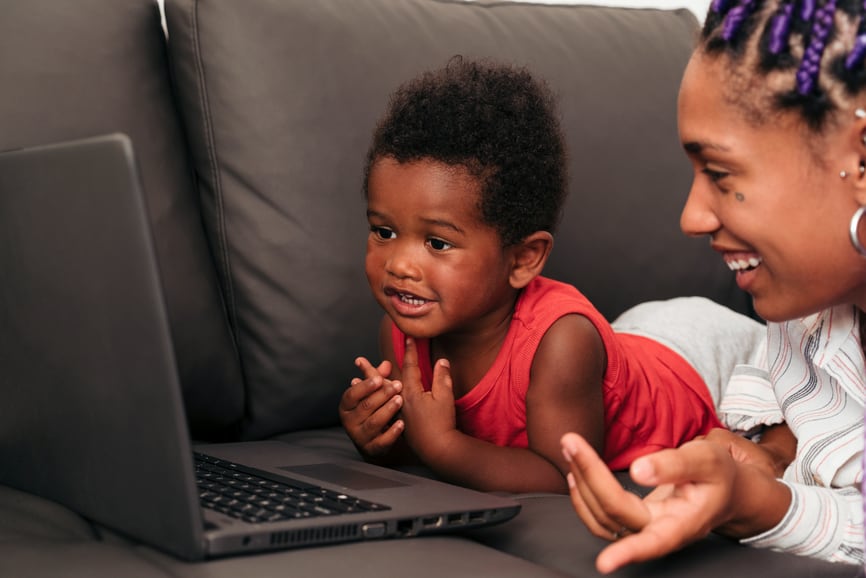
How To Better Support Black Students & Teachers
Written by Katie Hintz-Zambrano
Photography by Photography by LUCAS OTTONE
When was the first time you had a Black teacher? If it took you a while to answer this question (or came up blank), you would not be alone. Despite Black people making up 13% of the U.S. population and 15% of the country’s students, the number of Black teachers in U.S. schools hovers at a dismal 7%. But if Evalaurene Jean-Charles has her way, these stats will be a thing of the past.
As the founder of Black on Black Education, a platform designed to bring Black educators, experts, and thinkers together to increase learning in the Black community, Evalaurene’s ultimate goal is to create a better world for Black people. In addition to hosting a podcast and annual conference, and creating resources on anti-racist teaching (amongst many other topics), Evalaurene is practicing what she preaches in her day job as a special education earth science teacher at a charter school in the South Bronx. Below, the passionate founder (who runs Black on Black Education alongside her father) fills us in on her life’s work and how others can join the movement.
The benefits of having more Black teachers in schools are numerous. From your perspective, what are some of the biggest wins?
“Students benefit from learning from and about the diverse experiences of Black people in this country. Black teachers give that to all their students regardless of race. In predominantly Black schools, having Black teachers shows students that someone who looks like them can do great things. And predominantly white and more diverse schools also benefit from having Black teachers and other teachers of color because they get to take a look at the world outside of their own.”
Why do you think the country is falling behind in recruiting and retaining Black teachers?
“I think it’s because the system of education, like so many other systems, is committed to the status quo. When we look at our history, we have spent more time living through overt systemic oppression like slavery, Jim Crow, and redlining, and little to no time has been spent creating systems that directly combat the effects of social and systemic racism. The country is falling behind in recruiting and retaining Black teachers because it is not a priority. Schools administrators are not going to HBCU’s to recruit a strong Black teaching force, they are not doing the work when the Black teacher gets there to make them feel safe and cared for. Organizations like The Center for Black Educator Development in Philly, The Black Teachers Project in Oakland, and many more all over the country are doing this work. The Department of Education is not doing enough, and that’s why we are here.”
There’s a newfound commitment (at least verbally) of schools wanting to implement anti-racist curriculums. How do you suggest schools—and parents—advocate for a more diverse set of educators and anti-racist learning plans?
“Schools have to do more than just talk, and parents and students have to hold them accountable. Too often schools tell parents what their kids need to learn, how their kids need to learn, and who their kids need to learn from. I love that more schools are committing to teaching anti-racist curriculums, but we have to be very vigilant about what that means.
-
- Is there a policy in writing?
- In what courses will students receive this curriculum?
- Will they be tested on what they learn?
- How often will teachers have to be trained on the importance of anti-racism in their classrooms?
- Are the necessary changes to the disciplinary policy at schools going to be addressed?
These questions must be asked and answered because schools have forgotten that they work for us. We pay to keep the lights on and our children deserve the highest quality of education. Advocacy comes in many forms: write letters, sign petitions, organize protests, or walkouts, call the school’s superintendents, call your local public officials, call local and national news organizations, and tell them about your concerns, etc. There is so much that can be done, we just need to organize and get it done. Please reach out to us at Black on Black Education for support if and when needed.”
What can parents and institutions do to better support and retain Black teachers currently in the school system?
“The same way we should be supporting and retaining our students. Check-in on them, don’t make them the token Black teacher that has to plan all of the Black History Month festivities, create safe spaces for teachers of color to organize, identify their concerns, and listen when they are trying to create solutions. As a teacher, I understand how hard a job it is and institutions need to begin recognizing that and treating teachers accordingly. Black teachers and other teachers of color have consistently been forced to teach white dominant curriculums, in buildings that are harming their Black and Brown students. The way to support and retain Black teachers is simple: Listen to them, allow them to be a part of the path forward, and hold students and staff accountable for how they interact with race in the building.”
Tell us about your own personal relationship with school, starting as a child.
“I was a teacher who as a teenager rebuked the thought of being a teacher. I grew up in a fairly diverse community where I was a star student. My home life was complicated and thus I found comfort in being in school and putting my all into my studies. Because of my home life, I moved around a lot. I went to 7 different schools from 1st grade to 7th grade. I learned how to adapt and make friends, and no matter what school I was in, I worked hard in school. In 7th grade I no longer attended a diverse school, I went to a predominantly white high school and for the first time began to understand the ramifications of being Black. At that school, I learned little to nothing about my history and couldn’t wait to get out. This experience pushed me to attend John Jay, a very diverse college, and learn more about my Blackness and the contributions of Black people to this country and the world. It opened my eyes to the reality of the country I lived in and was forced to pledge allegiance to for 12 years, and I committed myself to be a part of fixing it.”

Evalaurene Jean-Charles
Tell us about the roots of Black on Black education.
“I started Black on Black Education in 2019 while watching an interview with the scholar and artist Akala in the U.K. He said ‘Black on Black education,’ referring to an after-school program he attended where he learned Black history for Black people by Black people. From the second that I heard him say that, I knew there was promise there. I went home to buy the domain name, I got the handles on all social media outlets, and called my dad. From that day on, we have been working together to support Black educators and Black students.”
What has been the most satisfying part of running this organization?
“The Black Education Conference. It was incredible to see so many people virtually come together to support Black students. This had been a dream of mine and it came true. My dad and our partner Chelsea Addison are big thinkers and we are extremely proud of what we created.”
“Overall, our dream is to create an alternative to the current white dominant society. The current state of education is built on racist ideology and is slow to move away from that. Rather than wait for that system to realize the harm it is doing to children, we want to create options for parents to give their children an education that loves and cares for their child while preparing them for the uncertain future ahead.”
What can folks do to support Black on Black Education?
“We accept donations on our website to help pay for operations costs. We would love for people to come to our events and learn and grow with us, follow us @BlackonBlackEd on social media (IG, Twitter, Facebook), share our page, and tell your child’s school about us to support their school in growing in their anti-racism efforts.”
Is there anything we should be looking for on the ballots that would better support teachers?
“The future of funding for public schools, the rise of funding private schools, and whether or not ‘patriotic education‘ will be implemented.”
Are there any resources that you would suggest parents consume in order to educate themselves on the state of American schools and also the challenges Black teachers and students face?
“We have an anti-racism guide here, filled with resources for teachers, parents, and students.”
Heading “back” to school—either in person or online—looks very different these last couple of years. Any tips on how parents can support students and educators during this transition?
“Parents should check-in with their children mentally. Check-in with your child about what is or is not working for them during this time and try to accommodate that. We are living through a time unlike any other and students are feeling that. Just like the rest of us, kids are struggling, and sometimes they just need the opportunity to vent, relax, and reset.”
“My advice to parents about how to support educators during this time is to give them grace. We are struggling. Our inboxes are full, our school administrators don’t know what’s going on, students are confused, our social lives are non-existent, and we are trying to educate and support students each day. We are not making excuses, but we are humans, and we are struggling; please be patient with us.”
For more on Evalaurene’s mission and how to get involved, head over to BlackonBlackEducation.com.
Share this story



